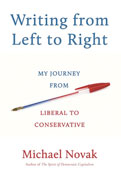 WRITING FROM LEFT TO RIGHT: MY JOURNEY FROM LIBERAL TO CONSERVATIVE
WRITING FROM LEFT TO RIGHT: MY JOURNEY FROM LIBERAL TO CONSERVATIVE
By Michael Novak
Published by Image Books, $24
Memoirs have always been a favorite literary genre. Some, like Winston Churchill's war memoirs, track important events from a single, and commanding, vantage point, yielding an insight into the contingencies of history. Others, like St. Augustine's Confessions or John Henry Newman's Apologia pro Vita Sua, detail a person's intellectual and spiritual development over time. Some, like Katharine Graham's Personal History, are just fun.
Michael Novak's Writing from Left to Right: My Journey from Liberal to Conservative is more Forrest Gump than Churchill. It evidences none of the brutal self-inquiry displayed by Augustine or Newman, and, unlike Graham's memoir, it is just not fun to read. In shifting his ideological identity from liberal to conservative, Novak's thinking became essentially thin, and this memoir mimics that thinness.
Novak speaks of his relationship with Ronald Reagan, but only mentions meeting him briefly in the doorway of the West Wing and at a dinner at the home of Clare Boothe Luce (an encounter cut short by a power outage). Likewise, he pronounces Pope John Paul II a "friend" after having dinner with him and attending his morning Mass a couple of times. He and Sargent Shriver worked hand-in-glove on a couple of different projects, but there is no connection drawn from that work and Novak's intellectual development. Along the way he remembers some things poorly, writing, "Because of his late start in the 1972 race for the vice president, Shriver's cause was almost hopeless." It was not hopeless because of the "late start." The cause was hopeless because Shriver was Sen. George McGovern's running mate and elections for the vice presidency rise or fall with the top of the ticket.
As Novak turned right, his writings turned not only thin, but sometimes obscene. How else to describe the 1982 essay, "A Theology of the Corporation," a piece of agitprop that contains these words: "For many years, one of my favorite texts in Scripture has been Isaiah 53:2-3: 'He hath no form or comeliness; and when we shall see him, there is no beauty that we should desire him. He is despised and rejected of men; a man of sorrows, and acquainted with grief; he was despised and we esteemed him not.' I would like to apply these words to the modern business corporation, a much despised incarnation of God's presence in this world." To take one of the most poignant, heart-wrenching, culturally fecund verses of Isaiah, and turn it into a bumper sticker for Wall Street, might work as a joke. But Novak, sadly, was serious.
His fetish for capitalism has not deepened intellectually in his retelling of the tale today. He devotes a couple of pages to his first encounter with supply-side economics in the late 1970s and writes, "Maybe I am only an amateur, but the logic makes sense to me."
Somehow, that verdict is not very illuminating, is it? Twice he notes that the Johnson administration's "war on poverty" accomplished a great deal, especially for the elderly and for some African-Americans, but he never explains why these programs worked for these groups and not others, or what the partial success of these programs says about the viability of government action in the economy to achieve a more just society. Instead, he goes on at length about how and why they failed in other respects. There are important questions to be asked, but Novak's lack of inquisitiveness dominates.
When discussing abortion, his crassness comes through. He writes, "The official Democratic absolutism on the issue of abortion may be undermining the essential premises of the welfare state. This is not a new insight, and admittedly it is but a utilitarian one, in spite of the fact that the issue at hand goes much deeper. But it's a plain fact: the higher the number of future workers who are aborted, the fewer workers there will be to fund each recipient of old-age benefits and Medicare." Somehow, it never occurred to me that the horror of abortion was a fiscal horror.
Novak is an enthusiast, not a thinker. He writes that one of his main goals upon becoming a neoconservative was to "rethink capitalism in a moral and religious language." Of course, Adam Smith supplied a strong moral and religious language for the system he crafted, and wittingly or not, Novak has come to share its Calvinistic premises. But this "rethinking" was really an exercise in advertising, not an exercise in thinking. This author fails to note, and fails to exhibit, the importance of self-criticism in democracy. Novak perfectly epitomizes the blindness of Catholic neocons when it comes to their slavish idolatry of markets, writing, "Lower tax rates awaken 'animal spirits.' " Of course, in the neocon worldview, such spirits are fine in the boardroom but not in the bedroom -- an idea that has helped them hold on to the evangelical vote.
Novak is considered by virtually everyone who has known him as one of the nicest men in Washington, and we need more nice people in Washington. He still writes at times with skill and grace. But everything that grates about Catholic neocons, especially their self-regarding confidence that the world would be such a better place if everyone just thought as they did, is on full display in this badly conceived tome. He did not write from left to right; he wrote from left to superficial, and he is still doing it.
[Michael Sean Winters writes about religion and politics on his Distinctly Catholic blog.]
Advertisement
Advertisement



